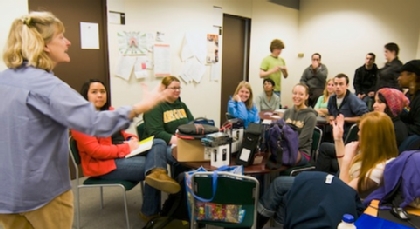Page 208 • (2,965 results in 0.013 seconds)
-
. Faculty play a critical role in the assessment process, and faculty benefit when they have the support of representatives across the campus community for the assessment process itself and for the time that it takes to do assessment well. Under the best of circumstances, assessment is collaborative, with a wide aim to understand the multiple components involved in student learning including libraries, technology centers and writing labs, to name a few. Jan Lewis, PhD, Associate Provost for
-
–winning, applied research and media production organization housed within the Center for Media Studies at Pacific Lutheran University’s School of Arts and Communication. MediaLab students work on projects across the media spectrum, including market research, photography, graphic design, web design, writing, video, public relations, event planning, filmmaking, and more. Read Previous Student travels to NYC to speak on media convergence Read Next ‘In Flux’ shows snapshot of art students in transition
-
GNUR 701: Foundations of Scholarly Writing & Communication (2) GNUR 706: Biostatistics, Analytical Methods, & Epidemiology (3) GNUR 702: Advanced Practice Roles & Collaboration (1) Fall 2024 6 credits – Tuition: $7,164 GNUR 703: Theoretical Foundations & Evidence-Based Practice (3) GNUR 707: Quality Improvement & Research Methods (3) January 2025 5 credits – Tuition: $5,970 GNUR 704: Pop Health, Policy, & Politics (2) GNUR 708: Leadership & Resource Management (3) Spring 2025 6 credits – Tuition
-
Foundations of Scholarly Writing & Communication (2) GNUR 702 Advanced Practice Roles & Collaboration (1) Fall 2024 11 credits – Tuition: $15,301 GNUR 703 Theoretical Foundations & Evidence-Based Practice (3) BMBA 511 Accounting for Decision Making (4) BMBA 513 Marketing Management (4) January 2025 2 credits – Tuition: $2,782 GNUR 704 Pop Health, Policy, & Politics (2) Spring 2025 10 credits – Tuition: $13,910 GNUR 705 Information Systems & Patient Care Technology (2) BMBA 510 Legal/Ethical/Social
-
to $2500 will be awarded this summer for research, reading, and writing, which must lead to the creations of a major paper on a Holocaust topic. Who can apply? PLU students who meet the following qualifications at the time of application: 1. A grade point average at PLU of 3.3 or better; 2. An academic record of interest in the Holocaust (to include the successful completion of any HGST course). 3. A total of 64 total credit hours toward graduation earned prior to the summer in which the
-
history, the history of Auschwitz, the history of the Holocaust, Jewish refugees, and Holocaust denial. At this time he is writing a book on the history of the concentration camp barrack. Robert Jan van Pelt An internationally recognized authority on the history of Auschwitz, van Pelt’s work was featured in the BBC-Horizon programme “Blueprints of Genocide,” and he acted as a senior consultant to the BBC/PBS series Auschwitz: Inside the Nazi State. Van Pelt chaired the University of Waterloo School of
-
history, the history of Auschwitz, the history of the Holocaust, Jewish refugees, and Holocaust denial. At this time he is writing a book on the history of the concentration camp barrack. Robert Jan van Pelt An internationally recognized authority on the history of Auschwitz, van Pelt’s work was featured in the BBC-Horizon programme “Blueprints of Genocide,” and he acted as a senior consultant to the BBC/PBS series Auschwitz: Inside the Nazi State. Van Pelt chaired the University of Waterloo School of
-
to $2500 will be awarded this summer for research, reading, and writing, which must lead to the creations of a major paper on a Holocaust topic. Who can apply? PLU students who meet the following qualifications at the time of application: 1. A grade point average at PLU of 3.3 or better; 2. An academic record of interest in the Holocaust (to include the successful completion of any HGST course). 3. A total of 64 total credit hours toward graduation earned prior to the summer in which the
-
November 11, 2009 Poetry helps explain a complex world Rick Barot wasn’t looking for how to address worldly issues when he began writing poetry. “I think, like a lot of poets, I started in poetry having very self-serving reasons,” the PLU professor said. In college, it was therapeutic and very much an emotional release. But as he learned the craft and honed his own skills, the complexity of it and how poetry can be used in addressing ethical, even moral values became clear. “These days, I think
-

little bit cumbersome, but really worth it, even though I was not able to bring a spare change of clothes. After several stages of repacking, I was able to fit everything else into one checked bag. Airline regulations are changing so much lately that I wanted to make sure that I had everything checked conservatively. It would be awful to show up to the airport and have to leave half of my gear behind. I am writing this post from our final class period on campus prior our departure. All of us met
Do you have any feedback for us? If so, feel free to use our Feedback Form.


